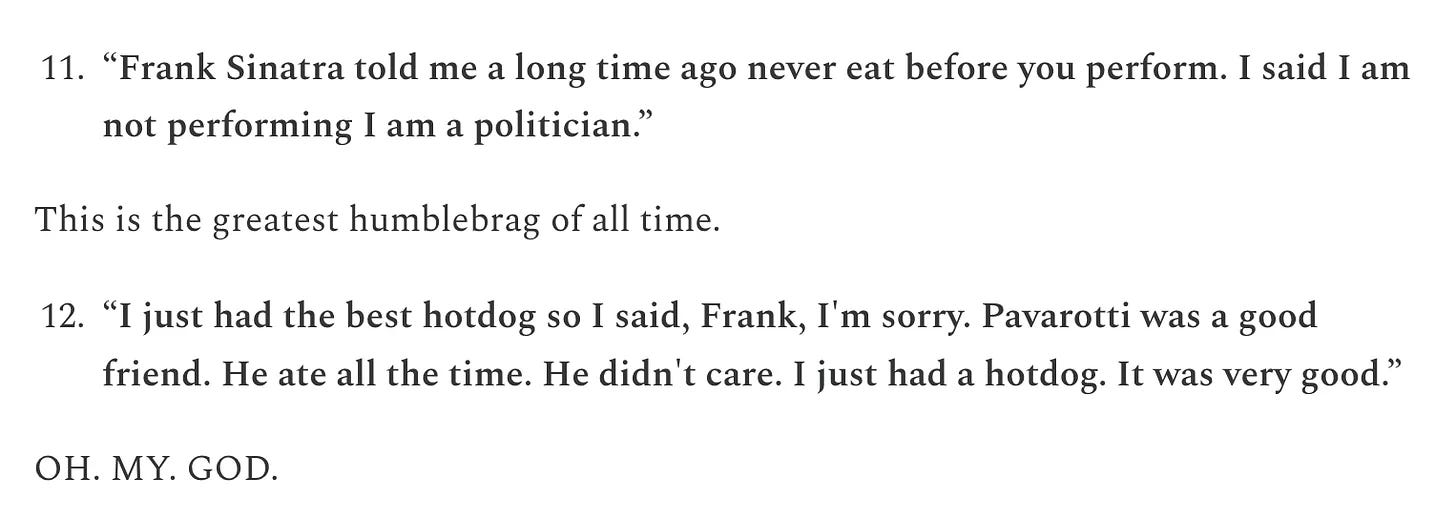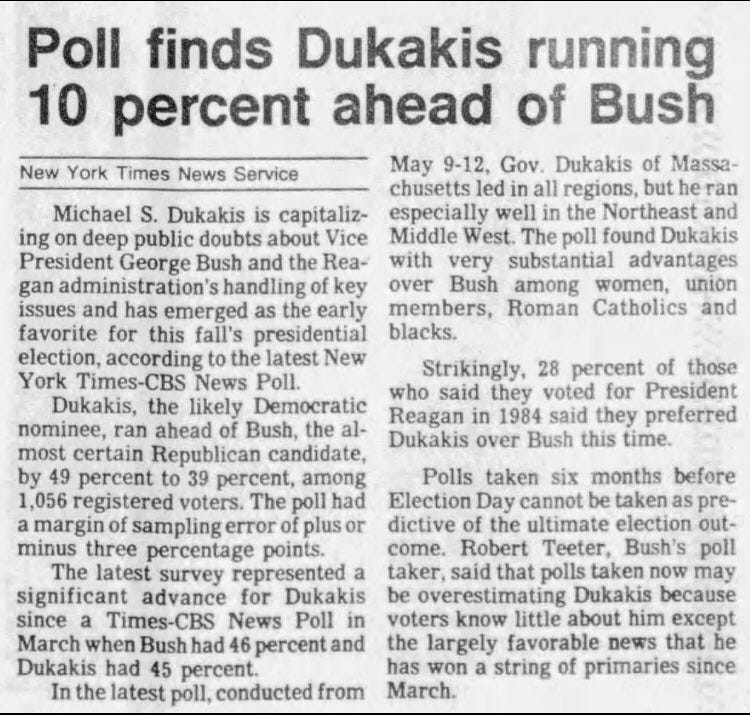On Trump's Hot Dog Word Salad
Bad news for gourmands. Some good news, however, for the Biden campaign
Will America elect the authoritarian manqué in November? Will the people find nourishment in Trump’s wholly unappealing hot dog word salads? This weekend, the former President travelled to the Jersey shore and served to his audience a most unremarkable rhetorical plate of doggerel, doused in grease and — as always with this man — a liberal application of the catsup. (Averted Gaze)
While legacy media obsesses over excruciating detail every perceived cognitive weakness in POTUS, they neglect to mention what can only be properly construed as Trump’s own penchant for rhetorical surrealism. James Fallows does an excellent job deconstructing the bald soprano’s bad salads. This weekend on the Jersey shore, Trump’s word salad contained, of all ingredients, hot dogs — drizzled with an incoherent dressing of this:
“Don't forget he [Biden] can't put two sentences together. He can't find the stairs off the stage. Let's see this stage when I'm finished. I got stairs there. I got stairs there. I got a nice ramp there. I got stairs. If it got really dangerous, I could jump off the front.”
I cannot even begin to fathom the blast radius of a Trump jump and the geological tensions that might be involved, or, more to the point, what the hell the former President possibly means by this:
Because Sinatra died in 1998. And Trump didn’t officially dip his toe into politics until the Birther movement, in 2011. Is Trump lying? Is he experiencing acute mental decline in real time? Is The Donald experimenting with freeform poetry on the mic? Psychedelic mushrooms? And why drag poor Luciano Pavarotti’s corpse into the proceedings? To borrow a line from Father John Misty, we should let this dead guy sleep …
Further, Trump’s ground game thus far in the election cycle has been weak. This, of course, has more than a little to do with the absorption of the RNC and his legal liabilities into his family. But more on Lara Trump later … Meanwhile — North Carolina, a former GOP stronghold, is emerging as a swing state (good news). Look at the chart below of Presidential elections in the tarheel state (via Brookings):
Haley won 23% of the vote and 11 delegates in North Carolina. “In North Carolina, the Raleigh-Durham-Cary combined statistical area has been a center of growth for the state,” write Elaine Kamarck and Deirdre Keenan for Brookings. “Since 2020 alone, this area has seen its population increase by 5.6%—making it the 10th fastest-growing area in the country.” Raleigh-Durham-Cary, we cannot fail to note, is the type of place a never Trump message might find an audience. The Biden campaign would do well to compete there. A pleasant piece of news for those that prefer democracy to strongman rule.
So — what is the meaning of this thusness? Why is Trump — only four years younger than Biden — perceived as so much more vigorous and robust? His ground game notwithstanding, dominance politics is a term being bandied about nowadays, as to why the race remains so close. “Fortune favors the bold,” quipped Niccolo Machivavelli. Moreover, the notion that boldness creates its own reality distortion field and that pointy-headed liberals wearing glasses are unable to counter it is not novel, but it is packaged together well here by M. Steven Fish in the Times:
Today’s Republicans are all about dominance. They embrace us-versus-them framing, double down on controversial statements and take risks. Today’s Democrats often recoil from “othering” opponents and back down after ruffling feathers. They have grown obsessively risk-averse, poll-driven, allergic to engaging on hot-button issues (except perhaps abortion) — and more than a little boring.
Polling even dictates whether Democrats proclaim their own good news. Republicans never quit crowing about the economy on their watch. Democrats tend to fear doing so unless surveys show that everyone is already feeling the benefits. So in defiance of much of the evidence, voters think Mr. Trump’s economy was better than Barack Obama’s and Mr. Biden’s.
Politicians’ language reflects their dominance orientations. Mr. Trump uses entertaining and provocative parlance and calls opponents — and even allies — weak, gutless and pathetic. Still, neuroscientists monitoring listeners’ brain activity while they watched televised debates found that audiences — not just Mr. Trump’s followers — delighted in the belittling nicknames he uses for his opponents. His boldness and provocations held audience attention at a much higher level than his opponents’ play-it-safe recitations of their policy stances and résumés.
Michelle Goldberg is also particularly good on this. “The ex-president and the people who surround him often seem drawn to violence and lurid displays of dominance,” she writes in the Times today. The GOP appears to be in the process of defining deviancy down. True: Trump speaks in hot dog word salads, but he does so with great gusto! Biden has been transformative, but he speaks lightly and with a stutter. ¿Quién es más macho?

Then there is also the matter of free media and social, which is not insignificant to Trump’s present position. President Biden has more cash on hand than Trump, as incumbents often do. And that is not likely to change much as the former burns through legal fees and his daughter-in-law is in charge of the RNC (Exaggerated cough). March, however, was the cruelest month for the Trump campaign, as Jessica Piper and Steven Shephard noted in Politico in April:
Biden’s campaign spent $29.2 million in March, much of which — about $21.8 million — went toward advertising. The president’s campaign launched a major advertising blitz in seven swing states following last month’s State of the Union address.
In contrast, Trump’s campaign, which is mostly keeping its powder dry for the fall, spent just $3.7 million. His other groups did spend money on fundraising costs and legal fees — but when it came to core campaign outlays in March, Biden outspent Trump by nearly a factor of eight. Trump’s campaign spent less last month than Sen. Sherrod Brown (D-Ohio) — perhaps the most vulnerable senator from either party — did for his reelection bid.
That was then; this is now. Trump has a larger social media following and, because of those trials (both a blessing and a curse), he has more media — free media — mentions, which offsets somewhat the incumbent’s money advantage. But will all that free press remain a “blessing” if Trump is convicted in one of those cases? In the event of that occurrence, the free media will turn from an advantage to an amplification of his corruptions.
There is also the matter of those polls. One hundred and seventy days before election day, polls are virtually meaningless. Never mind that polls this far out are predictive of naught else but how the campaigns will respond. I will leave below this story — via Mark Jacob — accompanying The New York Times-CBS poll in mid-May of the 1988 presidential race:
Finally, the President made the argument to donors earlier this month as to why the polling doesn’t matter. Have a taste, dear reader. I assure you it is more palatable to your politically sophisticated tastes than Trump’s hot garbage mess.
“As Donald Trump’s criminal trial in Manhattan reaches a critical turning point, an amusing paradox has emerged. For once, Trump claims to be happy with his lawyers’ performance after a long history of fractious relationships with his attorneys. This might ordinarily be a welcome development for him — but the problem is that they are not doing a particularly good job defending him. Put simply, Trump’s legal team has made several considerable, and at times baffling, missteps over the course of the trial that have increased the odds of a conviction. Adding to the strangeness of all this is the fact that Trump’s defense team is probably the strongest group that he has assembled in any of his various legal proceedings to date. The principal lawyers are experienced criminal litigators who, as a group, are moderately to very well regarded among New York City’s white-collar bar. At the moment, it’s impossible to know for sure how Trump will ultimately fare in the case. The trial is now likely to turn in large part on the jury’s assessment of Michael Cohen’s credibility, which has always been the central risk for prosecutors. But it’s also clear that Trump’s lawyers are pursuing a flawed and risky strategy. Why? Most likely it’s not them, but him. Trump is the client, and he gets the final word on major decisions. So far as I can tell, this team has managed to stay on Trump’s good side by indulging — perhaps necessarily — his worst traits and instincts. It may be their downfall.” (Ankush Khadori/Politico)
“In March 1999, NATO launched an aerial campaign against the regime of Slobodan Milošević, the Serbian strongman and president of what was then Yugoslavia, aimed at stopping Serbian forces from massacring ethnic Albanians in Kosovo … Then, on May 7, a US bomber unloaded on China’s embassy in Belgrade … China, for its part, erupted in fury, including via its state media; meanwhile, protesters took to the streets in the greatest numbers since the government brutally suppressed the Tiananmen Square uprising a decade earlier. Eventually, tempers cooled … But this claim didn’t sit right with Jens Holsøe, a journalist for the Danish newspaper Politiken. He began digging into the incident, and a few months later published a bombshell investigation—in partnership with The Observer, the sister paper of The Guardian in the UK—alleging that the embassy strike had in fact been deliberate; the two papers claimed, citing ‘senior military and intelligence sources in Europe and the US,’ that Western officials had found out that the embassy was being used to transmit communications on behalf of Milošević’s army.” (Jon Allsop/CJR)
“Evan Gershkovich of The Wall Street Journal and Alsu Kurmasheva of Radio Free Europe/Radio Liberty are in Russian jails awaiting almost certain conviction at trials yet to be scheduled -- and maybe, only then, a trade. Much of the Western press no longer feels able to live inside Russia … So, what now?” (Peter Osnos)






